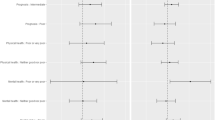Abstract.
Do not resuscitate (DNR) discussions are difficult for physicians and patients alike, resulting in DNR orders being written shortly before death. To understand the patients' point of view, interviews about the perception of DNR discussions were conducted as a pilot study. Fourteen patients with refractory cancer were asked to rank the favorability of DNR discussion scenarios on a Likert scale with 1 meaning most unfavorable and 7 meaning most favorable. The most favorable scenarios were assurance that pain will be controlled (6.9); assurance of nonabandonment (6.9); information about hospice care (6.6); and DNR discussion conducted by attending physician (6.6). The least favorably rated scenarios were delivery of recommendation by physician with whom patient had had no prior contact (1.8); presence of unknown medical personnel with physician (2.0); refusal of physician to answer questions (2.1); and agreement between physician and patient to discuss only positive aspects of patient's case (2.1). This study supports the importance to the patient of a supportive relationship with the attending physician who is both attuned to the need for comprehensive palliative care and is honest about the prognosis.
Similar content being viewed by others
Author information
Authors and Affiliations
Additional information
Electronic Publication
Rights and permissions
About this article
Cite this article
Pentz, R.D., Lenzi, R., Holmes, F. et al. Discussion of the do-not-resuscitate order: a pilot study of perceptions of patients with refractory cancer. Support Care Cancer 10, 573–578 (2002). https://doi.org/10.1007/s00520-002-0374-z
Issue Date:
DOI: https://doi.org/10.1007/s00520-002-0374-z




